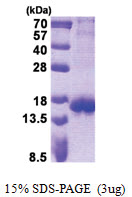CD152 / CTLA4 (36-161, His-tag) Human Protein
Other products for "CTLA4"
Specifications
| Product Data | |
| Species | Human |
| Expression Host | E. coli |
| Expression cDNA Clone or AA Sequence |
MGSSHHHHHH SSGLVPRGSH MGSKAMHVAQ PAVVLASSRG IASFVCEYAS PGKATEVRVT VLRQADSQVT EVCAATYMMG NELTFLDDSI CTGTSSGNQV NLTIQGLRAM DTGLYICKVE LMYPPPYYLG IGNGTQIYVI DPEPCPDSD
|
| Tag | His-tag |
| Predicted MW | 15.9 kDa |
| Concentration | lot specific |
| Purity | >90% pure by SDS-PAGE |
| Presentation | Purified |
| Buffer | Presentation State: Purified State: Liquid purified protein Buffer System: 20 mM Tris-HCl buffer (pH 8.0) containing 0.4M Urea, 10% glycerol |
| Preparation | Liquid purified protein |
| Protein Description | Recombinant Human CTLA4 protein, fused to His-tag at N-terminus, was expressed in E.coli. |
| Storage | Store undiluted at 2-8°C for one week or (in aliquots) at -20°C to -80°C for longer. Avoid repeated freezing and thawing. |
| Stability | Shelf life: one year from despatch. |
| Reference Data | |
| RefSeq | NP_001032720 |
| Locus ID | 1493 |
| UniProt ID | P16410 |
| Cytogenetics | 2q33.2 |
| Synonyms | ALPS5; CD; CD152; CELIAC3; CTLA-4; GRD4; GSE; IDDM12 |
| Summary | This gene is a member of the immunoglobulin superfamily and encodes a protein which transmits an inhibitory signal to T cells. The protein contains a V domain, a transmembrane domain, and a cytoplasmic tail. Alternate transcriptional splice variants, encoding different isoforms, have been characterized. The membrane-bound isoform functions as a homodimer interconnected by a disulfide bond, while the soluble isoform functions as a monomer. Mutations in this gene have been associated with insulin-dependent diabetes mellitus, Graves disease, Hashimoto thyroiditis, celiac disease, systemic lupus erythematosus, thyroid-associated orbitopathy, and other autoimmune diseases. [provided by RefSeq, Jul 2008] |
| Protein Families | Druggable Genome, Transmembrane |
| Protein Pathways | Autoimmune thyroid disease, Cell adhesion molecules (CAMs), T cell receptor signaling pathway |
Documents
| FAQs |
| SDS |
Resources
Recombinant Protein Resources |
{0} Product Review(s)
0 Product Review(s)
Submit review
Be the first one to submit a review
Product Citations
*Delivery time may vary from web posted schedule. Occasional delays may occur due to unforeseen
complexities in the preparation of your product. International customers may expect an additional 1-2 weeks
in shipping.






























































































































































































































































 Germany
Germany
 Japan
Japan
 United Kingdom
United Kingdom
 China
China
